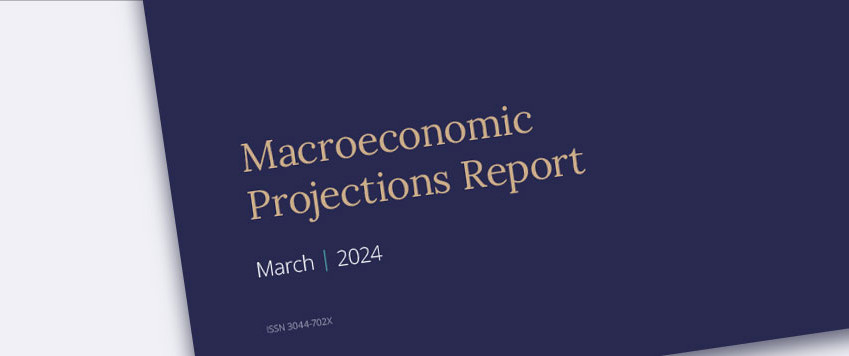Macroeconomic Projections Report. March 2024

- While inflation has also significantly declined on a global scale, substantial challenges for further global economic development persist as global uncertainty remains high and some developments point to rising geopolitical tensions.
- Despite more buoyant global growth overall, external demand from Latvia's main trade partners, Estonia and Germany in particular, is estimated to have weakened. Nonetheless, the situation in external markets is expected to gradually improve over the medium term.
- In the euro area, inflation and the economic growth forecasts have been revised downwards compared to the December forecast. While the Governing Council of the ECB maintains tight monetary policy, the financial markets anticipate that the pivot is not far off. Consequently, the euro area financial conditions have already become more favourable.
- Despite expectations of upcoming interest rate cuts, the banking sector exhibits cautiousness both in terms of credit demand and its supply.
- The assessment of the general government budget balance both for this year and for 2025 has remained broadly unchanged. Based on assumptions that the government investment will increase more than previously anticipated, the budget deficit is projected to rise towards the end of the forecast period in 2026.
- The budget deficit is projected to stand at 4.1% of GDP in 2024, 3.4% of GDP in 2025 and 2.3% of GDP in 2026.
- Due to the expected weakening of nominal GDP growth and decline in inflation, the government debt level has been revised upwards to 44.3% of GDP for 2024 and to 45.2% and 45.7% of GDP for 2025 and 2026 respectively.
- The short-term GDP growth forecast for 2024 has been revised downwards to 1.8% due to weaker external demand. The outlook for medium-term growth has remained unchanged at 3.6% for 2025 and 3.8% for 2026.
- Given the weakness of external demand, the activity in the manufacturing and transport sectors is expected to be lower in the short term. Retail trade has exhibited more inertia as consumer sentiment, even with a rise in purchasing power, is improving only slowly. The outlook for the construction sector growth has remained broadly unchanged: the sector will be supported by the progress in large infrastructure projects implemented with EU funding and a gradual expansion of investment in the private sector.
- In the light of weaker economic activity, the unemployment forecasts have been revised upwards to 6.5% and 6.3% for 2024 and 2025 respectively. The unemployment forecast for 2026 has remained consistent with its previous forecast at 6.1%.
- There have been no revisions to the wage forecast, with the projected increases in wages remaining above their long-term averages at 8.0% for 2024 and at 7.9% and 7.6% for 2025 and 2026 respectively.
- Meanwhile, the inflation forecasts for 2024 and 2025 have been revised downwards to 1.5% and 1.9% respectively primarily due to a significant decline in global gas prices. The inflation forecast for 2026 has remained unchanged at 1.8%.
x
Textual error
«… …»
Report error to the website editor


